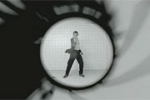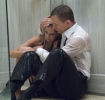Casino Royale
I love pop culture. This may or may not have already become apparent given the content of this site. Vampires, spies, detectives, aliens, time travellers, demons, evils from the dawn of time… All, in their own way, awesome. But even better than garden variety pop culture is the pop culture that has history. Sherlock Holmes. Doctor Who. James Bond. The stuff that’s had to reinvent itself, reimagine itself, bend and twist with the times.
And yet, for all that supposed bending and twisting, mostly, things stay the same, especially with Bond. Not a film goes by when someone doesn’t say: “We’re getting back to the basics of Bond” or “This film is closer to Ian Fleming’s original vision”. Or, indeed, “This film is different to all the others.” I was fooled last time. James Bond gets captured, they told me. It sounded cool. It was cool, until suddenly, in the blink of an eye, the film turned into a sub-par Moore-esque parody of itself.1
So colour me amazed that they’ve finally gone and done it. Someone relinquished the rights to the very first Bond novel, Casino Royale, and those Brocolli-people2 have actually decided to take a brand new approach to the whole thing. To start the Bond continuity from scratch.3 Crazy. Well, not really. In this age of Lost and Batman Begins it makes a lot of sense. And, it works. And, it doesn’t lose its nerve halfway through and turn crap. Yes folks, it’s the One True Bond Film, come at last.
So, there’s this agent in the British secret service. You know his name. He’s arrogant, almost inhumanly tenacious, but prone to rash decisions. He’s just been promoted to double-0 status and given a licence to kill, but his boss isn’t quite sure it was a good idea. He’s after Le Chiffre, a prominent banker for terrorists around the world, or more accurately, he’s after Le Chiffre’s address book. He’s not too clever about it; keeps on screwing up. But even though his boss M witheringly describes him as “a blunt instrument”, both she and the audience know — he’s got potential.
You’ll have noticed from the way that I didn’t mention giant lasers, EMP sattelites, world wars or nuclear bombs, that Casino Royale is a little more down to earth than one is used to from the Bond franchise. In fact, it’s amazing how much of the accumulated Bond crap they’ve been willing to ditch. And even the stuff they keep, they question and reinvent. It’s like they’ve finally worked out the sheer power hidden in the back of the series; Bond is a world famous icon, and there’s so much fun to be had playing around with that. Staples like “Bond, James Bond” have been sprinkled around previous films like seasoning — this time, they’re given weight and purpose.
While elements like Q, and gadgets in general, aren’t around this time, M is of course still here. Dame Judi Dench gives her best performance ever, and really feels like a believable boss for Bond. I’m glad M is still female; it throws the battle between his relationship to his duty and to Eva Green’s Vesper Lynd into sharper contrast. Both women are willing to manipulate him, yet both come to realise that he’s more than just a thug.
In the same way that it felt unfair to compare Christopher Eccleston’s Doctor Who to previous interpretations, it feels unfair to compare Daniel Craig’s Bond to his predecessors. For one of the first times ever, Bond is treated like an actual character, with emotions, development and all those things that everyone gets to have in ‘proper’ films. Craig does all this well, but at no point does he lose the violence of Bond. In almost all his scenes, you get the feeling that he’s always ready to break into action. People have said he’s the best Bond since Connery. They’re almost certainly right.
Years ago, I wept a manly tear when, in Die Another Day, CGI effects were used to make Bond do a reasonably stupid stunt. Nothing could have been more against the spirit of these films; the best stunts, done for real. Casino Royale fights back against that trend with incredible, yet believable stunts. The action is superbly directed; no shaky cameras covering dodgy gaps here. Jumping, driving, shooting, falling, exploding. The film is nicely paced to cover the fact that a large stretch of it has to involve a card game; the two best action sequences come at the start, so that you almost feel like a breather by the time you arrive at the casino.
The scenes after the casino however, aren’t quite as tight. There’s a fine line between keeping the audience guessing, and simply making them wonder if the film’s forgotten that it’s supposed to end sometime soon. A few less scenes could’ve made all the difference. But things end well.
Jokey, insincere self-parody used to be the order of the day for Bond. That’s not the fashion these days, which is good, because now that they’ve ripped the crap out of Bond, what we’re left with is amazingly fresh for the 21st film made about a character. James Bond has returned.
- Still, at least it started decently, unlike the original sub-par Moore self-parodies. Well, started decently not including the surfing. ↩
- I’ve got an image in my head now and it amuses me. ↩
- A remarkable choice in a 21-long movie series that’s only ever paid lip-service to continuity of any sort. Just typing the words “Bond continuity” seems like some sort of oxymoron. ↩



Andy
December 19th, 2006 at 8:20 am
That is Ba’al. I don’t care what IMDB says.
It felt a lot more like a spy film. Bond was playing cards while killing and conducting his other spy stuff.
I liked the lack of a bad guy intent on world domination. It makes a change from recent films; no evil corporations, no nazis or aliens. Unfortunately, a series of villains who are killed sequentially gave the plot a convoluted nature. After peaking at the casino, it dropped off and never really recovered. It is similar to that Bourne film, although in this case I didn’t mind, because the open end fits well with the idea that Bond is off on more missions.
Tom
December 19th, 2006 at 8:40 am
Oh, come on. From this angle, he’s impressively not-Ba’al-looking at all.
It felt very much more about the espionage, and the series of contacts along the way helped that for me. Not that I’m well acquainted with international terrorism, but I assume that it works something like that. I’m not sure what I base that on though.
I felt like the film recovered with the final action sequence, and the conversation between M and Bond, and the final line. I thought it covered up it’s lagging section quite nicely with that.
Indeed. With Bond, he’s clearly been pushed back in the direction of the service at the end, and has a clear destiny. Not like Bourne, who presumably will hide himself again only to be found again at the beginning of the next film.
hayko
December 30th, 2006 at 7:19 pm
They did have quite a range of gadgets but they were all in the background and basic looking. Like the bomb on the airplane tanker remote controlled by a mobile.
I found the last twist with the girl turning and another set of villains a tad bit confusing. Maybe a second viewing will clear it a bit. I mean I know what is going on, it just seems jumpy.
But yes, I had and still have skepsis over Craig, but the character in this film has much more to himself than lines like “I thought Christmas only comes once a year”. He seems like a professionally trained killer, but new and naive to the job.
And what about this violence? I can take a lot. Really, throw in blood, bones, explosions, knives – I don’t care. But now cut-out chairs give me the creeps. Ugh.